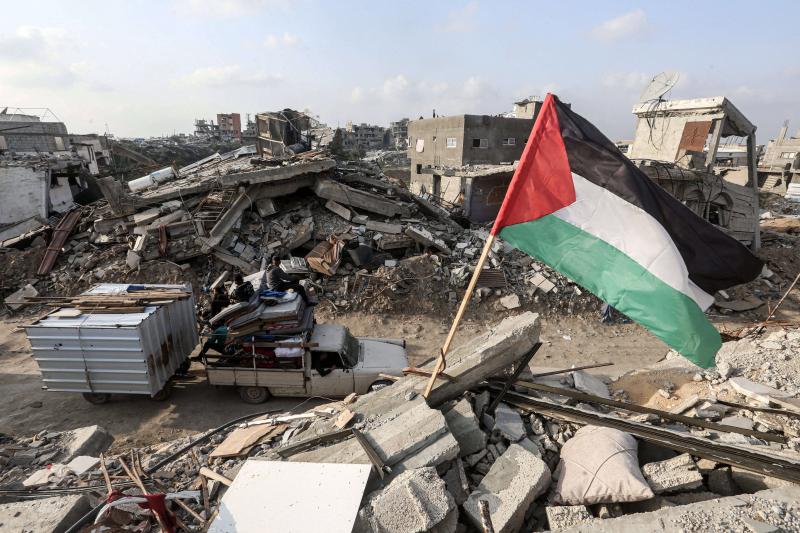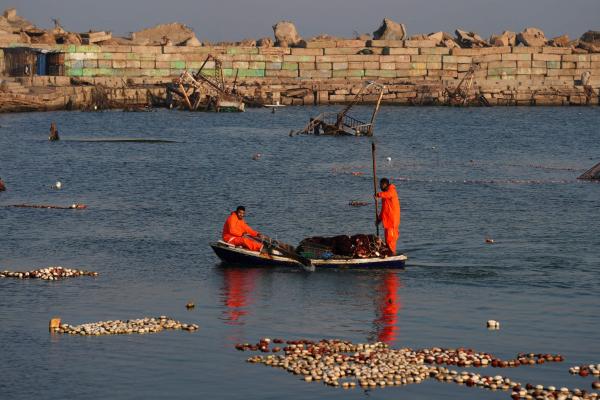In the halls of empire, men sit at gleaming tables untouched by war, they speak of peace as though it is theirs to grant. But they have never gathered their children into one room to sleep at night so that if death comes, it takes them together. They have never watched the sky split open with fire, felt the air convulse after the blast, felt the wind howl past — hot, violent, and thick with the dust and scent of obliteration. And yet, they sign their names to ceasefires, shake hands, and expect the world to applaud. They do not blush as they bankroll the demolition of homes, the bombing of hospitals, and the erasure of entire families.
During the first week of February, U.S. President Donald Trump hosted Israeli Prime Minister Benjamin Netanyahu, who is the subject of an International Criminal Court arrest warrant for committing war crimes and crimes against humanity. This meeting took place as the fragile ceasefire agreement between the Israeli occupying forces and the Palestinian militant group, Hamas, hung in the balance. Trump, never one to concern himself with the nuances of international law (or any law, really), originally floated the idea of the U.S. “owning Gaza” on Feb. 4 and then has since doubled down on this colonial fantasy, one so crude and reckless that his own administration scrambled to downplay it.
Despite all of this, the first phase of the ceasefire, which began on Jan. 19, has mostly held and is set to end on March 1. As of today, 25 Israelis, including captured soldiers and civilians (among them the remains of four hostages, two of whom were young children), in addition to five Thai hostages, have been released in exchange for over 1,000 Palestinians, some militants but mostly civilians.
The ceasefire brings a sigh of relief to many. With its announcement, Palestinians took to the streets celebrating. When the Netzarim corridor reopened allowing those who fled south to go back to their homes in the north after 15 months of displacement, they returned, lifting their voices in ululation even as they walked through wreckage, dust, and ruin. There is joy because even the smallest respite from death is worthy of rejoicing. There is the impossible hope of a people who, even after everything, believe that maybe this time, something will change.
Israelis have also been celebrating the deal, expressing joy over the return of their loved ones. Yet despite this joy, ultra-nationalist Zionist parties rage, condemning the deal, and decrying the release of Palestinian detainees. Far Right politicians led by former minister of national security Itamar Ben-Gvir withdrew from the governing coalition in protest. Some of those released by the state of Israel were as young as 12 years old. But in the doctrine of the Israeli state, there are no Palestinian children, only enemies-in-waiting. This is not just the belief of Netanyahu’s Far Right coalition, but a major feature of occupation and apartheid, which is at the foundation of the state of Israel.
The world has mistaken these moments of suspended violence for progress toward lasting change, as if expecting us to endure perpetual occupation instead of genocide is the solution to 76 years of disenfranchisement. Imagining that this ceasefire would guarantee our freedom. But a ceasefire alone does not attain such freedom or safeguard our rights. The ceasefire does not unbuild settlements or dismantle military checkpoints. It does not return stolen land, lift the suffocating blockade on Gaza, or grant us the right to return, let alone move freely within our own homeland. The ceasefire, regardless of whether all the phases are applied, is not an end to the occupation.
But there is nothing new in this deceptive peace. History is full of those who declare peace while upholding violence and justifying oppression while calling it order. And in the face of such injustice, we are reminded of the words of prophet Jeremiah, who spoke to a people on the brink of destruction, betrayed by leaders who cloaked cruelty in false assurances. He declared:
“They have treated the wound of my people carelessly, saying, ‘Peace, peace,’ when there is no peace. They acted shamefully; they committed abomination, yet they were not ashamed; they did not know how to blush” (Jeremiah 6:14).
Jeremiah’s rebuke was not just for those who waged war but for those who enabled it under the guise of peace: the kings, priests, and prophets who comforted the powerful while forsaking the vulnerable. They draped oppression in religious ritual, proclaiming that the temple in Jerusalem made them invincible, even as corruption, injustice, and idolatry flourished. They worshipped Ba’al, the god of war, while claiming to serve the God of justice. Jeremiah’s indictment is not confined to the past but reflects the present situation: Morality is numbed when systemic injustice becomes so routine that those who perpetuate injustice cease to feel shame.
2025-02-16t000000z_1269169517_mt1imgost000ypj98x_rtrmadp_3_imago-images.jpg

Such moral numbness can be seen in Washington, D.C., as elected officials ignore the occupation and, instead, focus on negotiations that only perpetuate further the subjugation of Palestinians instead of doing the moral thing: demanding Israel end the occupation. Trump’s proposal for Gaza is an example of how U.S. officials ignore systemic injustice. Although a stark departure from decades-long U.S. policy in its brazenness, Trump’s position on owning Gaza is not so different from Biden enabling Israel to bomb Gaza. Trump’s rhetoric is merely the latest iteration of longstanding U.S. policy championed by every president of the United States since Palestine’s partition, policies that have enabled and perpetuated the disenfranchisement and dispossession of Palestinians.
In fact, it was the Biden administration, back in October 2023, that first suggested the idea of moving Palestinians from Gaza — albeit under a different proposal. The words were softer: “humanitarian corridors,” “safe zones,” and even clandestine offers for financial relief for host countries. But the intent of mass displacement — and ethnic cleansing — was the same. This plan was similarly rejected by Jordan and Egypt. This impulse, whether manifesting as ethnic cleansing by force or displacement by deceit, has always been bipartisan and it leaves little doubt in our minds that U.S. officials are the architects of our subjugation. This is how empires have always operated — from the Roman Empire to the American Empire.
When Rome ruled over Jerusalem, it was in the name of law and order that they crucified Jesus, punishing resistance to oppression while upholding the violent status quo.
And when Jeremiah cried out against the false prophets who declared peace where there was none, was it not because their words concealed the truth, seeking only to pacify the oppressed and make them forget their chains?
Empires do not blush when they speak of peace while bankrolling genocide, occupation, and apartheid. They do not blush when they speak of humanitarian aid while supplying bombs.
The world has seen this pattern before: A deal or a ceasefire is declared, prisoners are exchanged, the headlines shift, and the Western conscience is eased. But then what? The blockade holds, refugees remain in exile, the occupation continues, more Palestinian land is swallowed up by illegal settlements, and more families are displaced. The cycle of violence does not end with a ceasefire. At best, it is simply delayed.
Rev. Munther Isaac, the Palestinian pastor of Bethlehem’s Evangelical Lutheran Christmas Church, spoke to the contradictions of this moment in a January social media post:
“While a ceasefire is certainly something to celebrate, it cannot be our goal. This is not a moment to rest …Moreover: will those who committed war crimes ever be held accountable? At the same time, we can’t help but feel angry and frustrated that it took this long. Gazans have suffered a lot. They deserve to simply live in their homeland. Palestinians deserve to live in dignity and peace in their homeland. A ceasefire will not end apartheid…. Our land, ruled by racists, is fragmented and torn apart by checkpoints, settlements, and segregation policies.”
These are not abstract concerns. They are the questions that haunt every ceasefire, every pause in an unceasing war on Palestinian existence. Isaac’s words echo a truth Palestinians have always known: a ceasefire is not liberation. It is a temporary reprieve — necessary, yes, but it is not the end of the struggle, and it is not an invitation to rest.
When Pharaoh’s heart was hardened, Moses did not plead for reforms or temporary relief. He demanded total liberation: Let my people go.
And so, to the question of whether the ceasefire can be accurately described as peace, I would answer as I imagine the prophet Jeremiah would: There is no peace.
There will only be peace when Palestinian children are free from the shackles of occupation and apartheid, when drones stop killing innocent civilians, and when the walls of segregation are dismantled. Until then, we will make the world remember that Palestinians are still here, still resisting, still demanding the one thing that has never been given to us but is rightfully ours: freedom.
Got something to say about what you're reading? We value your feedback!




